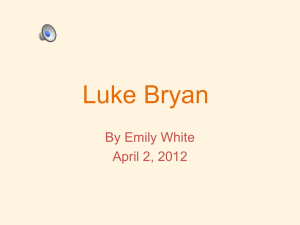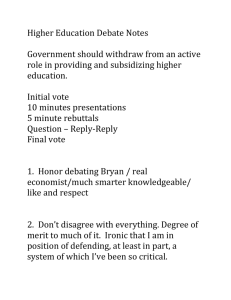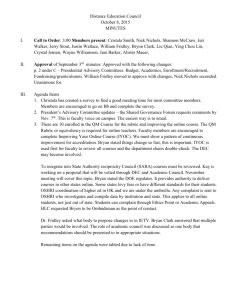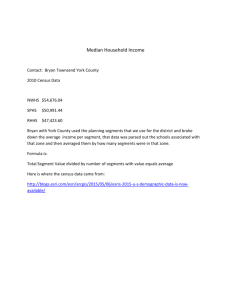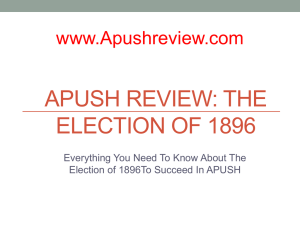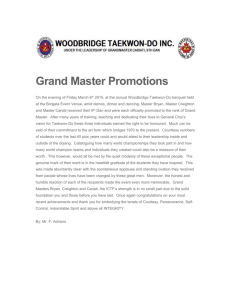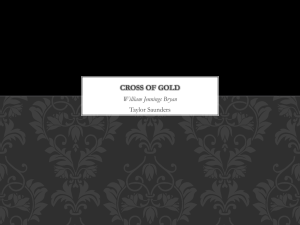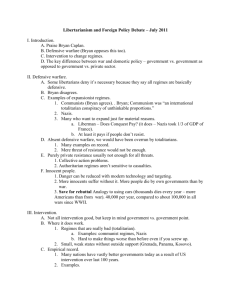The Myth of the Rational Voter: Towards a Future Edition
advertisement
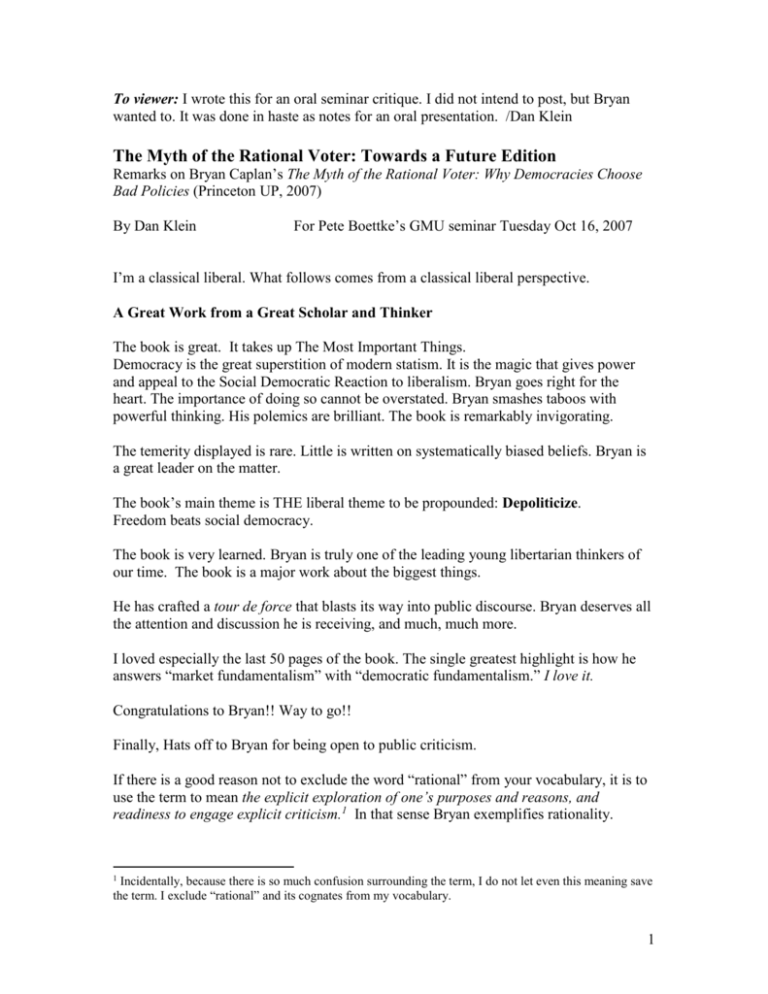
To viewer: I wrote this for an oral seminar critique. I did not intend to post, but Bryan wanted to. It was done in haste as notes for an oral presentation. /Dan Klein The Myth of the Rational Voter: Towards a Future Edition Remarks on Bryan Caplan’s The Myth of the Rational Voter: Why Democracies Choose Bad Policies (Princeton UP, 2007) By Dan Klein For Pete Boettke’s GMU seminar Tuesday Oct 16, 2007 I’m a classical liberal. What follows comes from a classical liberal perspective. A Great Work from a Great Scholar and Thinker The book is great. It takes up The Most Important Things. Democracy is the great superstition of modern statism. It is the magic that gives power and appeal to the Social Democratic Reaction to liberalism. Bryan goes right for the heart. The importance of doing so cannot be overstated. Bryan smashes taboos with powerful thinking. His polemics are brilliant. The book is remarkably invigorating. The temerity displayed is rare. Little is written on systematically biased beliefs. Bryan is a great leader on the matter. The book’s main theme is THE liberal theme to be propounded: Depoliticize. Freedom beats social democracy. The book is very learned. Bryan is truly one of the leading young libertarian thinkers of our time. The book is a major work about the biggest things. He has crafted a tour de force that blasts its way into public discourse. Bryan deserves all the attention and discussion he is receiving, and much, much more. I loved especially the last 50 pages of the book. The single greatest highlight is how he answers “market fundamentalism” with “democratic fundamentalism.” I love it. Congratulations to Bryan!! Way to go!! Finally, Hats off to Bryan for being open to public criticism. If there is a good reason not to exclude the word “rational” from your vocabulary, it is to use the term to mean the explicit exploration of one’s purposes and reasons, and readiness to engage explicit criticism.1 In that sense Bryan exemplifies rationality. 1 Incidentally, because there is so much confusion surrounding the term, I do not let even this meaning save the term. I exclude “rational” and its cognates from my vocabulary. 1 Criticisms Is It a Matter of Beliefs? Bryan puts heavy stress on the idea of belief. But is it useful to think of votes or even survey responses as declarations? Not much commitment involved (Brennan and Lomasky2). Brennan and Lomasky Expressive acts vs. Bents vs. Preferences over preferences vs. Bryan Declarative statements Biases Preferences over beliefs The Brennan and Lomasky view better admits preferences for statism. Such an admission is valuable and important. Bryan interprets actions in a certain way that is often quite strained. Statist Bents : We Need to Enlarge the Scheme I have to say it again: Bryan has courageously busted forward in talking about statist biases or bents. After finishing preparing these notes, I realize how timid other academic libertarians have been in this regard and am even more impressed with his courage and leadership in this primary matter. Bryan suggests four biases: anti-market, anti-foreign, pessimism, and make-work. It’s not clear if the four are supposed to be explanations or simply categories. If explanations, they seem facile—saying that anti-market beliefs are explained by an antimarket bias doesn’t really take us far. We need a richer scheme of statist bents, penchants, and mentalities. Appendix 1 offers a table of possibilities. One of the overarching aspects of the various bents is the idea of society as organization. Bryan’s four biases can be neatly incorporated as manifestations or expressions of bents in Appendix 1. 2 Democracy and Decision: The Pure Theory of Electoral Preference (CUP, 1993). 2 The society-as-organization idea dovetails with various notions about sources or origins of statist bents: the evolutionary environment, the hierarchical self, the family, intention organizations in society. Also, there is the contemporary culture. Bryan says very little about sources and origins. He doesn’t do much to explain the biases. He hardly mentions evolution. He mentions Paul Rubin only very briefly. He downplays the culture as a source of statist bias. Bryan characterizes statist biases but does little to explain them. The bigger point of Appendix 1: Bryan’s formulation strongly portrays the bents as lowstrata phenomena. This comes from the construction of his “enlightened” opinion and his focus on education, smarts, and expertise. The formulation paints him into the position of saying high-strata right, low-strata wrong. No mention of ideas like Irving L. Janis Groupthink. Such ideas give theoretical support to high strata bias. It would be OK if Bryan said he is choosing to focus on low strata, while acknowledging that separate high strata bents could also be operating. The omission is a half-truth, a kind of error. Scholars have a temptation to overdraw things so as to make their ideas look important and original. I think Bryan may have succumbed: 3 Hayek is entirely neglected. Never cited or indexed. In “Atavism,” Mirage, Fatal, and elsewhere Hayek tells a narrative that sees social democracy as the modern reassertion of society-as-organization yearnings, sentiments, bents and penchants. Hayek has high and low strata conspiring against liberalism. The pretense of knowledge conspires with the collectivist instincts. High-strata bents also treated by Mises, Schumpeter, Nozick, Sowell (“Vision of Anointed”).3 Others treat statist bents: Higgs on ideology, crisis, and fear; Buchanan “Afraid to be Free,” Boudreaux “False Consciousness,” Jeff Friedman on public ignorance, Munger on ideology (which I haven’t consulted), my “People’s Romance,” which highlights how democracy is the magic of modern statism. All these recent works say systematic statist bias. Many others, too. Bryan cites Mises, Schumpter, and Sowell, but never in connection to ideas of high strata bias. 3 Beyond Mere Information Knowledge has three facets: Information (the facts as seen by the working or basic interpretation) Interpretation Judgment In my terminology, Bryan is emphasizing that problems arise not merely from lack of information, but from inferior interpretations (and, consequently, judgments). I love the point that Bryan is putting into sharp relief. But I have criticisms of the way he does it. “Classical Public Choice”—overdrawn? Bryan portrays “Classical Public Choice” as having highlighted informational ignorance and as having completely neglected the idea of statist bents. He then beats up on that representation (pp. 94-113). Bryan construes “rational ignorance” as only about mere information, and says Classical Public Choice never got beyond that. Two ways in which this may be wrong: 1. VA schoolers may have subsumed bad interpretation within their idea of “rational ignorance.” This is a reasonable usage of the term ignorance. At Dictionary.com, the first three definitions of “ignorance” are: “the state or fact of being ignorant; lack of knowledge, learning, information, etc.” “The condition of being uneducated, unaware, or uninformed.” “the lack of knowledge or education” All three definitions allow for bad interpretation as “ignorance.” If so, Bryan’s “rational irrationality” is a dimension or facet of the broader concept of “rational ignorance.”4 2. VA schoolers may have construed “rational ignorance” narrowly, as Bryan does, but then added on bad interpretation. That is, they allowed for systematic bent but did not locate it under “rational ignorance.” Bryan would likely reject these broader definitions as “catchall definitions” (p. 98), but that is wrongheaded. Bryan says that “ignorance” means either lack of bits of information or is vague tautology. This tack reminds me of Stigler. 4 4 Appendix 2 provides some examples of VA schoolers suggesting the idea of systematic bias. Bryan takes Anthony Downs and Donald Wittman to represent “Classical Public Choice.” They are neither VA school nor liberal (or so it seems to me). Buchanan is not indexed and scarcely cited. Essentially no mention of mainline VA figures like Rowley, Wagner, Lee, McKenzie, Shughart, Tollison, Congleton, etc. Tullock is cited and quoted a few times, but not in the PC section. It’s true that “most models” (p. 99) assume no voter folly. Public Choice spread out to non-liberal authors and purposes. The voter folly premise was downplayed for three reasons: tractability, academic inoffensiveness, accommodation of authors’ own statism. I think Bryan should have been more worldly to see all this. I think he should have striven to preserve and highlight the statist-bent premise where it may be found among or easily read into the work of VA scholars. Bryan is certainly right that the idea of biased beliefs/interpretations has been terribly underdeveloped in the VA school, but I think he oversells the originality of his key element. Does Bryan misrepresent “Expressive Voting” by Brennan and Lomasky? Bryan takes up “expressive voting” of Brennan and Lomasky (137-140), but does not represent them as part of Public Choice. Strange, given that Brennan has coauthored important work with Buchanan. Brennan is VA public choice. (Also, Lomasky too has coauthored with Buchanan.) Bryan paints their work in stark terms. Is this representation of Brennan and Lomasky fair? Is there not systematic bent in Brennan and Lomasky? Don’t Brennan and Lomasky represent a development of VA Public Choice? Some preliminaries are found in Appendix 3. Conceding too much to Wittman’s other premises? Namely competitive elections and low transaction costs in politics. I’m inclined to think so but won’t go into it.5 The result is that Bryan agrees with Wittman that democracy gives voters what they want: The status quo is what it is because that is what people want. But I am half inclined to say that people say they want the policies that are the status quo because they are the status quo. Bryan’s scheme extinguishes inquiry into such an angle. 5 See Charles Rowley, 1997, "Donald Wittman's the Myth of Democratic Failure." Public Choice 92 (1-2): 15-26. Charles Rowley and Michelle Vachris, "The Virginia school of political economy" in Beyond Neoclassical Economics, ed. F. Foldvary (1996). 5 Maybe Bryan grants Wittman’s other premises so as to pump the importance of the unbiased belief premise. “Irrationality” Bryan says that beliefs are rational iff ~ N (0, 2 ) . But: 1. I think it is a contrivance to take this framework from technical RE models and apply it to the matters at hand. Bryan often says that this idea is the definitive definition of “rationality” in economics. Calls this the “simple and appealing benchmark” (98). I don’t buy it. (The common definition among economists is acting so as to max U.) 2. How does one apply this definition to cases in which the “rational” belief is zero (or otherwise subject to a boundary)? For example, the optimal amount of protectionism. This problems seems to force Bryan into presenting a Figure (p. 10) in which the optimal amount of protectionism is positive.6 3. How do you apply this to an individual? Rick’s belief about protectionism is just one point. Maybe Bryan’s book should be called Myth of the Rational Populace, or Myth of the Rational Median Voter. How Does Bryan Judge Certain Beliefs to be Wrong? He makes out that it is based on the survey findings of Althaus’s “enlightened opinion” and of economists (principally the contrasts offered by the 1996 SAEE survey).7 Really, it is his own sensibilities. He would do better to say so. He could do so and then say: “And if you don’t put much stock in my judgment, consider the evidence from Althaus and SAEE.” This would be better science. It would be a fuller and clearer picture of what Bryan is really saying and pushing. Also, Bryan would then be freer to admit that well over 50 percent of AEA members are terribly wrongheaded on most status-quo interventions. If it happened that it was the sociologists who were relatively enlightened and libertarian, while economists were relatively foolish and statist, Bryan would have said Sociologists represent the more “rational” answers to questions. On p. 144 Bryan writes: “The conceivable positions range from complete free trade--0% tariff—to absolute embargo—infinite tariff.” We know Bryan thinks 0 is the “rational” tariff. Yet he doesn’t address 6 how ~ N (0, ) would apply in this case. 7 I don’t want to get into Bryan’s treatment of economists’ opinions. The strongest statements of “economists right, public wrong” come on pp. 81-83. Perhaps his most dubious statements are on pp. 3536. 2 6 I realize that being upfront about his sensibilities would have made it clear that the book is a libertarian book, and would have dampened its readership and reception. Thus, maybe it is for the best that Bryan compromised scholarly candor. “Rational” Bryan goes on to claim that biases are chosen. Moreover, he claims that they are chosen “rationally”. Suppose we knew that Hal’s utility was maximized by buying 3 sodas when the price is $2, and 6 sodas when the price is $1. Suppose the price drops from $2 to $1 but Hal’s quantity demanded only goes from 3 to 4. Wouldn’t most economists say that buying only 4 is “irrational”, even though the behavior exhibits sensitivity to costs? Bryan provides compelling argumentation that the costliness of holding an idea will affect the tendency to hold it. But that is all Bryan argues. Suddenly, “rational” means, not ~ N (0, 2 ) , and not even that choice is pretty reasonably “optimal,” but merely that it is not totally unaffected by the cost. Instead of having to meet a high standard, he now employs a low “not totally insensitive to costs” standard. If Bryan wants to claim that the population chooses its “irrationality” such that ~ N (0, 2 ) , he has not given any evidence or argumentation. If he wants to claim that the individual chooses his “irrationality” so as to maximize his utility, he has not given any evidence or argumentation. Does Bryan Believe that the “Irrationality” is “Rational”? Bryan makes a wise and inspiring plea for challenging folly and for economic education. He says (p. 201) that he challenges his students: “I’m right, the people outside this classroom are wrong, and you don’t want to be like them, do you?” How does Bryan interpret the experience in terms of “rational irrationality”? Before class, Tess thought that the minimum wage was good for society. Bryan says that she chose that belief “rationally” (though Bryan is vague on the meaning). She hears the lecture and Bryan’s admonition about the kind of person she should be, and now she agrees that it’s bad for society. Bryan will say that again she chooses “rationally.” Presumably Bryan means that at both moments she chose so as to maximize her utility. So what happened during the lecture? Bryan has to say that the utility function changed. Bryan’s lecture destroyed one rational agent and created a new rational agent.8 8 Alternatively, Bryan might say that U fn has not changed, but that the lecture altered the constraints so as to make for a different optimal choice. But isn’t the potentiality for such effective alteration reason, then, for us to refrain from saying that the original choice was “rational”? Bryan’s terminological scheme eradicates the elements of potentiality and engagement that reside in our natural language. Moreover, 7 Doesn’t it make more sense to see Tess as a human being and to say simply that she came to a better understanding of the issue? We can throw the “rational” stuff out and carry on fine. For his argument, Bryan does not need the “irrationality” to be “rational.” It doesn’t matter if it is rational, irrational, nonrational, or arational—whatever those might mean. Bryan Does Not Come Round to Knowledge’s Richness Bryan writes (99): “Yet whatever words you prefer, two distinct causes of error remain: Either you lack sufficient data, or you fail to take full advantage of the data you have.” Bryan’s error is lumping three things into just two. “Taking full advantage” consists of two things, and Bryan indicates what they are when he speaks of “desire [and] wit”. Effort and wisdom. But he insists on lumping them together into one.9 Notice how he speaks of taking “full advantage.” Bryan is yet to embrace the distinction between information and interpretation. His tendency is to interpret “a better interpretation” as just a variety of information within the true framework of reality. Bryan should separate interpretation into its own category, and allow it to stand independent of “data” and of “desire” (or motivation/effort/interest). The failure to embrace a better interpretation might be due to not seeing or appreciating the better interpretation (as Jeff Friedman explains). It is a mistake to insist on reducing belief to choice. Choice can just as well be reduced to belief. The two stand in symmetric relationship: choice, belief, choice, belief, . . . . Embrace the regress. Smith-Hayek is dualistic. Bryan hates the regress and tends toward a monism that reduces all to choice. adopting Bryan’s scheme renders all behavior “rational”, and, therefore, the adjective “rational” is superfluous. 9 On the next page he calls failure to take full advantage “lack of mental discipline.” 8 The more philosophically sophisticated view10 sees knowledge as a matter of better or worse interpretations as a dialectic of better to even better—there is always an n+1st interpretation as “better” being a matter of human judgment; “better” comes from the lips of some human being. Bryan never considers “irrational irrationality.” Doing so would push him back to a third level, and point to indefinite regress. Adam Smith Quotation Neglected Adam Smith is nicely represented in Bryan’s book. But a key passage is not quoted. It is the WN passage where Smith says of the ordinary laborer: “his education and habits are commonly such as to render him unfit to judge [a social issue] even though he was fully informed.” (emphasis added) Within his bad interpretation, the laborer might be fully informed. Smith would not render the badness of his interpretation as a lack of information, because such a translation would imply a wider encompassing interpretation that is not relevant or sensible. “Disinterested Objectivity” On p. 101 Bryan speaks of “disinterested objectivity” and says that in politics it is “scarce.” The philosophical problem with Bryan’s thought is that he regards “disinterested objectivity” as a coherent notion. There is a final truth. Those who embrace it are rational, those who don’t are irrational. He suggests that, ultimately, everyone is rational. At a deeper level they all sense the truth. But then they indulge untruthful beliefs to feel good. He says that such individuals are “in denial” (p.124). The difference between Bryan’s “rational” and my “enlightened” is that I come clean on what I am really pushing—liberalism. I am saying “enlightened as we liberals understand it.” “Enlightened” does not mean “good for you.” It does not mean “unbiased errors.” It means beliefs that we think would better the condition of humanity.11 10 Known as philosophical pragmatism. The great exponent in economics is Deirdre McCloskey. Incidentally, certain contested sensibilities of what constitutes “betterment” will also be approached as the conversation expands. This does not mean that the case for abolishing the minimum wage is circular, it 11 9 Towards a Future Edition 1. Soften the emphasis on beliefs and bias. Go more with bents. 2. Drop all “rational” talk. Just go with terms like folly, foolish, unenlightened. 3. Confess libertarian sensibilities. Confess that the package you are selling is broader than a technical analysis of the effectiveness of democracy. 4. Doing so will enable you to take the stress off of expertise and the like. Acknowledge high-strata statist bents. 5. Place the work within liberalism through the ages, including esp Hayek and Public Choice.12 Like Hayek Hayek fudged the definition of “liberty” in CoL, and doing so may have been for the best. Likewise, aspects criticized here help to make Bryan’s presentation crisp, accessible, and less unpalatable to the public culture. By revising in the future, Bryan can have his fame cake today and his wisdom cake tomorrow. Adam Smith will love him for both. means that a larger package of beliefs is being offered. Liberalism is a focal large package, and some sensibilities about “betterment” are part of the offering. 12 Also, while you’re at it, change “price” to “cost” and “markets” to “freedom.” 10 Appendices to Dan Klein’s critique of Bryan Caplan’s The Myth of the Rational Voter. Appendix 1: Statist Penchants & Bents Table, by Dan Klein Strata Highstrata Allstrata Statist Penchants and Bents Governing-set mentality: high and looking up Self-exaltation, among the elites, close to the “alpha male” o Makers, o Representatives, transformers, personifications, symbols, liberators, deliverers protectors of way of life Managerial mentality and Parental attitudes: high and looking down Pretense of knowledge Parentalism and bogus compassion The people’s romance: State as project, endeavor, drama, narrative (“progressive,” hope) Common way of life, tradition: State as identity still-point, Hegelian “moment” (conservative, faith) Validation, government as phantom lord, submission, relinquishment of critical thinking at deepest levels, loss of irony Lowstrata Reverence of powerful/famous beings, kowtowing-obsequiousnessfawning-servility Social justice, equality, envy, resentment Slap-the-clown identity politics Notes: 1. An overarching aspect of the various bents is the idea of society as organization. That idea is primary, but I do not treat it as a bent in itself. It feeds into most of the bents listed above. 2. The table is not about sources or origins of statist bents. To my mind, the leading sources or origins are: the evolutionary environment, the hierarchical self, the family, intention organizations in society. Also, of course, there is the contemporary culture. 11 Appendix 2: VA School’s Invocation of Systematic Bias This compendium assembled 24 hours prior to the seminar. James Buchanan, “Afraid to Be Free: Dependency as Desideratum,” Public Choice, 2005, 124: 19-31.—the whole article suggests systematic bias. Here is a selection: “‘The spontaneous order of the market’ – this is an intellectual idea that is not naturally understood by those who have not been exposed to the teachings of economists. And economists themselves in their sometimes zeal for working out the intricacies of complex models have neglected their primary didactic purpose. They have assumed that, like the ideas in the natural sciences, once an idea is accepted by the scientific community, it will become a part of the conventional wisdom of the public, as implemented in institutional reforms. Economists, as the putative repositories of the principles of classical liberalism, have not sensed the categorical differences in public reception of their scientific findings and those of their fellow natural scientists.” Dwight Lee, “Politics, Ideology and the Power in Public Choice" in the Virginia Law Review Vol. 74, No. 2 (March 1988): 191-98, p. 192: "Indeed, public choice better explains ideological voting than do critics who point to ideological voting in an attempt to discredit public choice. The key to the public choice explanation for the importance of ideology in voting is found in the indecisiveness of the individual vote…" Roger Congleton, 1986, "Rent-Seeking Aspects of Political Advertising": "…political advertising may impose negative externalities on voters by providing biased appraisals of the likely outcomes of policy proposals and the risks involved. " Roger Congleton, 1991, piece on the role of ideology in the rent seeking society: "New transfer schemes which are said to move society closer to an accepted ideal naturally have greater appeal than those which go against the ideological grain. If the prevailing ideology leads voters to prefer transfers from the rich to the poor to other transfer schemes, such transfers will be more likely, other things being equal. In this manner, the current ideology of political decision-makers partly determines the range of politically feasible transfer schemes. ¶ Ideology also constrains the range of transfers insofar as it affects the domain of political debate. Success in policy debate is obviously an important matter. Special interest groups rarely have sufficient votes to directly determine the policy sought. Consequently, successful enactment usually requires the support of individuals who are not direct beneficiaries of the proposed program. …Or, of greater interest here, a majority coalition can be assembled by persuading enough voters who are not direct beneficiaries of a particular redistribution scheme that their indirect interest in a more perfect society is served. Such arguments are generally ideological in nature and serve to legitimize the transfer programs sought. ¶ Because not all arguments are equally persuasive, the ideological filters of the relevant population of voters shape 12 the domain of the policy debate. Ideological filters thereby affect both the rhetoric and reality of transfers." Charles Rowley, 1997, "Donald Wittman's the Myth of Democratic Failure." Public Choice 92 (1-2): 15-26: "Some minimal knowledge of economics and political science is essential for voters to be adequately informed." (19). "Wittman assumes that the tastes of agents in political markets are stable. But in political markets, ads and campaign expenses play a central role in changing preferences. Wittman regards this expenditure as purely informative." (18) "Driving much of this analysis is the assumption that competing political candidates align themselves along a single-dimension left-right issue space; that the voter needs only to identify which candidate is to the left and which is to the right and to vote for the one who better mirrors his own relative position. But this does not reflect the complexity of spatial politics." (19) Robert Higgs, Crisis and Leviathan: “By acting in concert with others who embrace the same ideology, they enjoy a solidarity essential to the maintenance of their identities. They cannot receive this form of utility without acting; there is no closet solidarity.” (54-55) “Thus does stage II of the ratchet occur. It is in large measure the product of citizens’ imperfect information and understanding and of the statist ideology that underlies the insistence that the government “do something” whenever a problem arises.” (67) [The next section on Brennan and Lomasky contains material that extends this Appendix.] 13 Appendix 3: Does Bryan misrepresent “Expressive Voting” by Brennan and Lomasky? Bryan, pp. 138-39: "In expressive voting theory, voters know that feel-good policies are ineffective." Bryan is force-fitting Brennan and Lomasky into a belief framework. They do not say voters know anything of the kind. They say that it is probably unhelpful to think of the voters knowing or believing either way. Bryan: "In contrast, rationally irrational voters believe that feel-good policies work." "But in most cases, the rational irrationality account is more credible." "Brennan and Lomasky's story is logically possible. But unless we relax the rationality assumption, it comes off as odd." Actually, I think that Bryan’s force-fitting of voting into a belief framework is odd. Turning to the question of systematic statist bents: I have only perused Democracy and Decision by Brennan and Lomasky. However, it didn’t take me long to find this: “The presense of whimsy and ignorance may be predictable, but their content is not necessarily so. There are, however, several other considerations that are sometimes mentioned in the context of revealed preference that do suggest a systematic and predictable bias . . .” (Brennan and Lomasky p. 39, emphasis added). They go on to suggest that things like social pressure and feeling good about oneself matter. If people live in a statist culture, then those factors spell statist bents. Bryan may be misrepresenting Brennan and Lomasky as saying that people know that the “feel-good policies are ineffective.” Brennan and Lomasky are not so much posing it those terms, I think. It is perhaps more a matter of expressing what “effective” means to the voter. What Bryan quotes from Brennan and Lomasky (on his p. 139) does not do much to sustain his representation of them. In fact, the last sentence he quotes would naturally be read as saying something like Bryan's "rational irrationality." The quotation from Brennan and Lomasky is: “Individual voters may, each of them, be entirely rational in voting for war—even where no one of them would, if decisive, take that course.” 14
